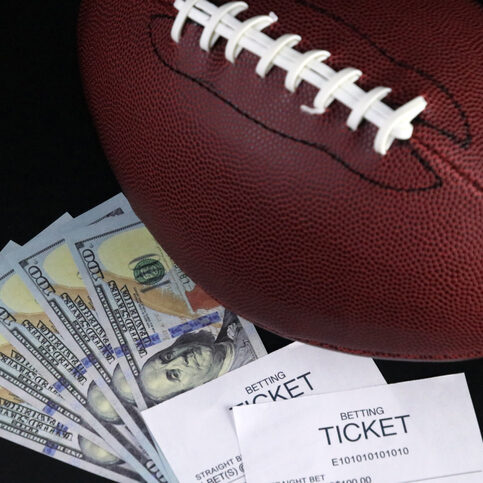Insights < BACK TO ALL INSIGHTS
Surging Sportsbook Signups Illustrate Need for Ubiquitous Legal Gaming Markets
Surging Sportsbook Signups Illustrate Need for Ubiquitous Legal Gaming Markets
By: Sara Dalsheim
The kickoff of the NFL 2023-2024 season has held many surprises: drastically favored teams lost to their underdog opponents; surprise rookies broke out like Bijan Robinson and Puka Nacua; sports media outlets aggressively reported on the Taylor Swift-Travis Kelce courtship; and much more. What has not been surprising, however, is the surge of signups on legal sports betting websites. Indeed, the influx of new users not only evinces the need for more states to legalize and regulate sports betting—lest their constituents turn to illegal, offshore sites—but also the importance of marketing affiliates in promoting legal sites at the detriment of offshore ones.
For instance, GeoComply released their Week 1 performance report that showed that 1.1 million new player accounts were created amongst their US sportsbook customer players, a 40% increase from the preceding season’s numbers.[1] Since the first touchdown of the season, by the Detroit Lions, GeoComply noticed a large spike in betting transactions – 4,200 transactions per second.[2]
States like Ohio, Maryland, and Massachusetts, which launched legal sports wagering after the start of last year’s NFL season, saw approximately 253,000 new player accounts from September 3, 2023, to September 10, 2023.[3]
Notably, GeoComply’s report also found a surge in demand in the unregulated states. During Week 1, GeoComply encountered and had to exclude over 1 million users from Alabama, Georgia, Minnesota, Mississippi, Missouri, and South Carolina who attempted to place wagers in the legal market from inside the states. GeoComply estimates that these states lost out on approximately $320.5 million in tax revenue, based on population size, estimated gross gaming revenue, and a tax rate of 15%.[4]
While GeoComply’s geolocation checks effectively block individuals in states without legalized sports betting from accessing out-of-state legal sportsbooks, this might push would-be bettors towards unregulated online sportsbooks. It’s unlikely that, upon being turned away, all, or even most, of these would-be bettors abandon all efforts to place wagers. In fact, we know that they don’t. GeoComply reported, for instance, that current and historical data shows that thousands travelled across state lines to bet in legal jurisdictions. As such, it’s plausible that other would-be bettors could more easily turn to illegal, non-geo-restricted online platforms that continue to thrive in unregulated states through their sponsored ads and prominence in web searches. These unregulated platforms often market aggressively in such states, misleadingly presenting themselves as legal options.
States without regulated sports betting inadvertently expose their citizens to harm by not providing a regulated and safe path for sports betting and other gaming activities. As we’ve also noted previously in other iGaming discussions covering legalized sports betting’s connection to increased sports integrity and the role of gaming regulator rules in securing customer data from cybersecurity attacks, legalization and effective regulation of sports betting ensures businesses are accountable to their consumers and to the jurisdictions in which they operate, thereby promoting responsible gaming and business practices.[5] As GeoComply stated, legalization “is the clearest path to put the state in the strongest position to protect consumers, establish accountability and raise revenues.”[6]
The demand for sports betting in unregulated markets underscores the need not just for legal sports betting platforms but also for legal sports betting vendors and suppliers such as marketing affiliates. Affiliates play a crucial role in guiding bettors to legal platforms, acting as a first line of defense against offshore, predatory platforms by decreasing their overall visibility.
Sports betting activities will continue to flourish in the United States, especially during the football season. States thus have two options: either provide a safe regulated market for their citizens or inadvertently expose them to harm via the persistent presence of illegal sports wagering operators. The need for the former becomes more pronounced as more states legalize and regulate sports betting—as the activity becomes more common, restricting it becomes increasingly futile. Without legal avenues, states throw their consumers into the arms of predatory and illegal platforms. Even for those otherwise uninterested in sports betting, legalization awards states with millions in tax revenues which provides countless improvements for the entire state’s populous.
[1] From the Sidelines the Mainstream: GeoComply’s NFL 2023 Week 1 sports betting performance report, GeoComply Blog (Sept. 13, 2023), https://www.geocomply.com/blog/from-the-sidelines-to-the-mainstream-geocomplys-nfl-2023-week-1-sports-betting-performance-report/#:~:text=GeoComply%20recorded%20242.3%20million%20geolocation,legal%20options%20across%20the%20country.
[2] Id.
[3] Id.
[4] Id.
[5] See Sara Dalsheim, Is Sports Wagering Regulation and Legalization Leading to More Sports Integrity?, Ifrah on iGaming Blog (May 25, 2023), https://www.ifrahlaw.com/ifrah-on-igaming/is-sports-wagering-regulation-and-legalization-leading-to-more-sports-integrity/; Jake Gray, States Rush to Protect Consumers From Cyber Threats as Gaming Legislation Moves Across All States, Ifrah on iGaming Blog (Aug. 25, 2022), https://www.ifrahlaw.com/ifrah-on-igaming/states-rush-to-protect-consumers-from-cyber-threats/.
[6] Id.





